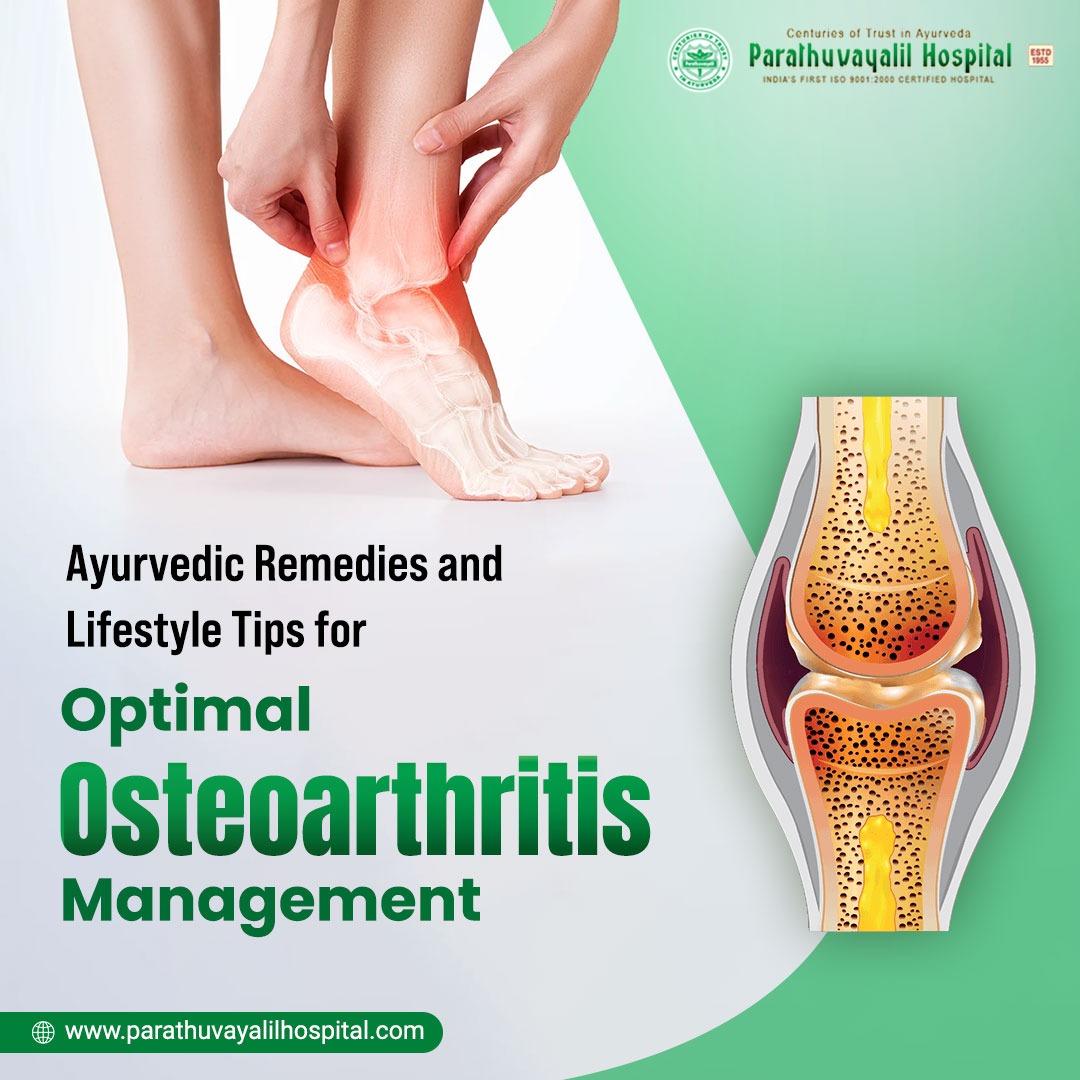
Ayurvedic Remedies and Lifestyle Tips for Osteoarthritis Management

Osteoarthritis, a degenerative joint disease, can cause pain, stiffness, and reduced mobility that affects millions of people worldwide. It develops as a result of gradual erosion of the protective cartilage that cushions the bone ends.
Ayurveda, an ancient holistic healing system, offers a comprehensive approach to managing osteoarthritis through natural remedies and lifestyle adjustments. This blog post delves into Ayurvedic remedies and lifestyle tips that can help individuals alleviate symptoms, promote joint health, and improve overall well-being.
Understanding Osteoarthritis from an Ayurvedic Perspective:
Ayurveda views osteoarthritis as a result of imbalances in the three doshas, Vata, Pitta, and Kapha. It recognizes that imbalances in these doshas can lead to joint degeneration and pain. Ayurveda also emphasizes the accumulation of ama (toxins) as a contributing factor to joint problems. Understanding these concepts helps in tailoring an effective Ayurvedic approach to managing osteoarthritis.
Main Symptoms of Osteoarthritis
The symptoms of osteoarthritis typically develop gradually and worsen as time goes on. Typical indications and symptoms of osteoarthritis include the following:
- Pain: affected joints may experience pain during or after movement.
- Stiffness: Joint stiffness is often most noticeable upon awakening or after a period of inactivity.
- Tenderness: Light pressure applied to or near the joint may cause tenderness.
- Reduced flexibility: The joint's range of motion may be limited, resulting in decreased flexibility.
- Grating sensation: A sensation of grating or grinding might be felt when using the joint, accompanied by popping or crackling sounds.
- Bone spurs: Hard lumps, resembling extra bits of bone, can develop around the affected joint.
- Swelling: Inflammation of the soft tissues around the joint can lead to swelling.
It's important to note that these symptoms may vary in intensity and frequency depending on the individual and the specific joints affected by osteoarthritis.
Herbal Remedies for Osteoarthritis Relief:
Ayurveda offers various herbs for managing osteoarthritis symptoms. Guggulu, a resin extract, possesses anti-inflammatory properties and supports joint health. Ashwagandha, an adaptogenic herb, helps reduce pain and inflammation while promoting joint flexibility. Shallaki (Boswellia) is known for its anti-inflammatory effects and can improve joint mobility. It is important to consult an Ayurvedic practitioner to determine the appropriate herbs, dosage, and duration of use for individual cases.
Ayurvedic Diet and Nutrition for Osteoarthritis:
The Ayurvedic osteoarthritis diet has a strong emphasis on including anti-inflammatory foods that promote joint health. Lean proteins, whole grains, and fresh fruits and vegetables are advised. Including joint-supportive spices such as turmeric, ginger, and cumin can help reduce inflammation. Promoting proper digestion and avoiding ama accumulation is achieved through mindful eating habits, such as chewing food thoroughly and avoiding overeating. Healthy fats and oils, such as ghee and sesame oil, contribute to joint lubrication.
Lifestyle Modifications for Osteoarthritis Management:
Ayurveda emphasizes the importance of maintaining a regular daily routine to balance the doshas. This includes waking up and going to bed at consistent times, as well as establishing a structured daily schedule. Gentle exercises and yoga asanas suitable for individuals with osteoarthritis can help improve joint flexibility and strength. Ayurvedic self-care practices, such as warm oil massages (abhyanga), promote joint health and reduce pain. Stress management techniques, such as meditation and deep breathing, along with adequate rest, contribute to overall well-being and can help manage osteoarthritis symptoms.
Ayurvedic External Therapies for Osteoarthritis:
Ayurveda offers specific external therapies for managing osteoarthritis. Janu Basti is a localized oil treatment that involves creating a reservoir on the knee joint using dough and filling it with warm herbal oil. This therapy helps alleviate knee osteoarthritis symptoms, such as pain and stiffness. Kati Basti is a similar treatment focused on the lower back, providing relief from lower back pain and stiffness. Pinda Sweda involves applying a herbal poultice to the affected joints, which helps reduce joint pain and inflammation.
Conclusion
Instead of just treating the symptoms of illnesses, Ayurveda believes in addressing the underlying causes of disease. By incorporating herbal remedies, following an Ayurvedic diet, making lifestyle modifications, and considering external therapies, individuals can alleviate symptoms, promote joint health, and improve overall well-being. At Parathuvayalil Ayurveda Hospital, we specialize in holistic approaches to arthritis management and provide personalized care tailored to your unique needs. Our Ayurvedic treatments concentrate on harmonising the energy in your body, reviving your joints, and promoting your general well-being. Book your appointment now and join the battle for a pain-free life!






